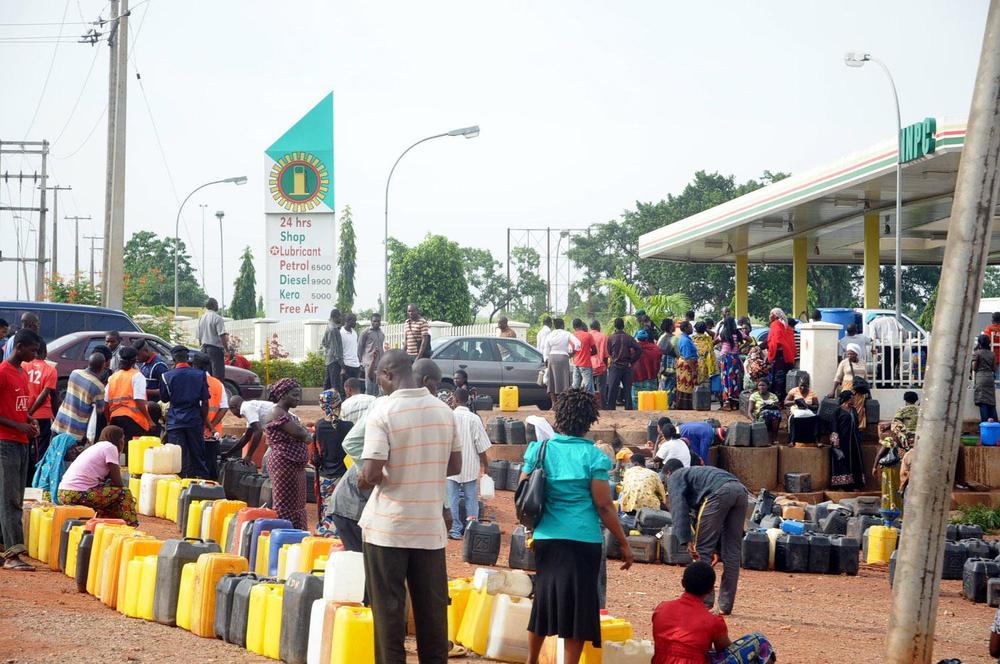Petroleum Products Scarcity
Since the downturn of oil price in the middle of 2014, petroleum products have drop in price worldwide except in Nigeria. The official pump price is ₦87 per litre for PMS; however, today it goes for a minimum of ₦150.
There has been accusations and counter-accusation between the FG and Petroleum Product Marketers. The minister of Finance Ngozi Okonjo-Iweala has accused the Petroleum product marketers is blackmailing the FG, and ganging to stop the selling of petroleum products to consumers within the federation. She claimed barely a week after reaching an agreement to pay marketers over ₦200billion of claims, that the marketers are yet to be selling petroleum products to consumers; furthermore, that the marketers are demanding that she sign to pay another ₦159billion which is meant to be payment for differential due to the changes in exchange rate.[1]
Nigerians need petrol, diesel, etc to run their vehicles, to power their homes and to run their businesses. It is really biting hard on all Nigerian citizens and residents alike, individuals and companies. Some foreigners have joined to hustle for the search and purchase of the scarce commodity.[2] Furthermore, this petroleum product scarcity has forced aviation companies like Arik Air to suspend operation, Virgin Atlantic to divert to Ghana for purchase of aviation fuels. Not left out are telecommunication companies Airtel, MTN, etc; they are finding it difficult to power their equipments in order to provide efficient services due to this scarcity of petroleum products.
| Picture courtesy of Symphony007 of Nairaland.com |
Why are we at the mercy of petroleum products marketers? Nigeria ranks the sixth largest exporter of oil, yet we import refined petroleum products for our consumption. We have four refineries in Nigeria, yet we are not feeling the impact of refineries in our economy; instead, we are being dependent on a group of petroleum marketers.
Back in 2012, most International Oil Companies IOC claimed that building refineries in Nigeria and the world at large was not profitable. This statement can be attributed to Mr Malcolm Brinded, the outgoing Executive Director of Shell Petroleum Development Company (SPDC). He based his claims on the information that there are surplus of refineries in the world; consequently, additional refineries in Nigeria will be at a loss to any entity venturing into the business. Furthermore, he claimed that it will be better to import refined products and pay the differentials in transport and exchange rates than to refine oil here in Nigeria.[3]
Now we see the results of not developing our refineries. If the FG made plans to build new refineries or at least maintain the old ones so that they run at optimum capacity, we would not be in this problem we have found ourselves. Let us look at the advantages and disadvantages of refining our crude oil in Nigeria.
Advantages
- Capacity building and development of locality.
- Job creation for citizens and residents.
- Savings on logistics of importing refined petroleum products.
- Potential export of excess refined petroleum products.
- More business opportunities for entrepreneurs.
- Elimination of petroleum subsidy.
- Elimination of round-tripping (making claims on locally refined product with the assumption that they are imported).
Disadvantages
- Long-term business plan.
- Huge investment.
- Lack of quick returns.
Merely looking at advantages and disadvantages, we will realise that if we really want this country to move forward, then we need to stop looking at only short-term solutions, stop patronising conmen pretending to be businessmen.
On another note, Nigeria needs alternatives to these petroleum products. The demand for petroleum products in Nigeria is mostly for electricity generation. Our refineries are not working; we are not generating enough electricity to power the nation. Solar power is a very viable solution if we must develop and grow.
References
http://solutiontree.blogspot.com/2015/05/petroleum-products-scarcity.html



No comments:
Post a Comment